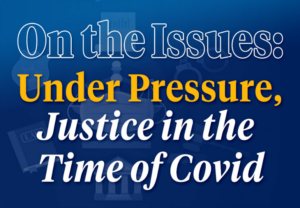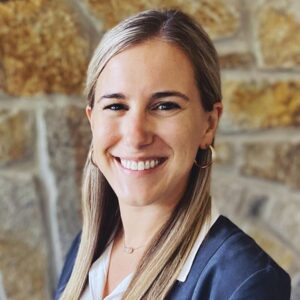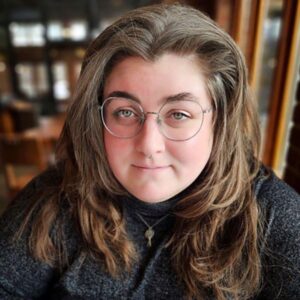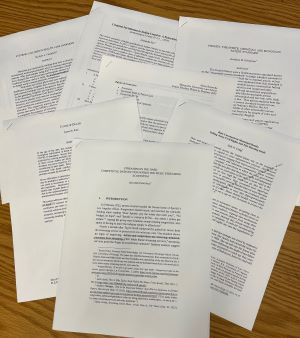Horrified but Optimistic: Criminal Justice System Leaders Assess Pandemic’s Impact in Milwaukee
 “Everything is connected to everything.” That phrase, spoken by Milwaukee County District Attorney John Chisholm, summed up much of the content of a program on the impact of COVID-19 on Milwaukee County’s criminal justice system on Tuesday (Sept. 26, 2023) in the Lubar Center of Marquette Law School’s Eckstein Hall.
“Everything is connected to everything.” That phrase, spoken by Milwaukee County District Attorney John Chisholm, summed up much of the content of a program on the impact of COVID-19 on Milwaukee County’s criminal justice system on Tuesday (Sept. 26, 2023) in the Lubar Center of Marquette Law School’s Eckstein Hall.
There were several ways of looking at that thought:
First, there was a long list of impacts of the COVID pandemic, including major services that were shut down, disrupted, or limited for long periods. It wasn’t one aspect of the pandemic that was the key, it was all the aspects coming together to impair the effectiveness of law enforcement and courts.
Second, as speakers at the program put it, the justice system is an ecosystem and problems in one aspect of the system impact problems in other parts. For example, a shortage of public defenders or court reporters or jails cells affects the work of police and courts broadly.
Third, five key leaders who were on the panel assessing the pandemic’s effect on the criminal justice system in Milwaukee emphasized how well they worked together during the pandemic, how closely they stayed connected to teach other, and how much they were not willing to point fingers at others in blame for major problems that occurred.
And fourth, as Chisholm put it, the justice ecosystem is part of the broader ecosystem of how the community functions or doesn’t function, as was especially true during the heights of COVID. One example: “You shut a school system down and then you’re shocked that a bunch of young kids are stealing cars and driving recklessly?” Chisholm asked.
Put all the impacts together and you have a justice system in which many services were reduced, problems increased, and bad things happened in Milwaukee.
The focus of the program was an August 2023 report from the Wisconsin Policy Forum titled “Under Pressure: The Milwaukee Justice System’s Recovery from COVID-19.”
Rob Henken, president of the policy forum, began the Lubar Center program with a summary of data collected for the report, including increased criminal offenses, led by a huge increase in motor vehicle thefts; a decline in arrests by Milwaukee police that Henken called “precipitous”; declining rates in how many criminal cases were being charged by the district attorney’s office; and development of a large backlog of court cases.
Reacting to the findings in the report were Chief Judge Carl Ashley of the Milwaukee County Circuit Court; Tom Reed, Regional Attorney Manager of the State Public Defender’s Milwaukee Trial Office; Jeffrey Norman, Milwaukee Police Chief; Mary Triggiano, who was chief judge in Milwaukee County during the heights of the pandemic and who is now director of the Andrew Center for Restorative Justice at Marquette Law School; and Chisholm. Moderating the program was Derek Mosley, director of the Law School’s Lubar Center for Public Policy Research and Civic Education.
Ashley, the current chief judge, said he was “extraordinarily proud” of the way leaders in the system as a whole worked to keep services going and deal with problems. While not minimizing problems that developed, he said he was optimistic that improvements in the system as a whole would come out of what was learned ruing the pandemic.
“We are not going to prison our way out of our criminal justice issues,” Ashley said. “This is a tremendous opportunity for us to do things differently.” He said how the system overall deals with people with mental health problems is one area where improvements can be made.
Reed described the challenges of keeping public defender work going during the pandemic, as well as in recent years more broadly. Shortages of attorneys to represent indigent defendants had developed and then grew worse during the pandemic. And without attorneys to represent defendants, cases could not proceed. Reed said there are points when he faced deep problems finding attorneys in a timely manner. Things have gotten better, he said, and provisions in the current state budget increasing pay for defenders, as well as assistant district attorneys, are beginning to help.
Triggiano said that at the start of the COVID crisis, people were told shutdowns would last two weeks. “Who knew?” she asked. She said that as much as backlogs built and problems grew, people worked cooperatively day and night to restore services. In some ways, such as the resumption of jury trials, the justice system did better than other sectors.
Norman said that data such as the number of crimes and arrests needed to be looked at in the context of all that police were dealing with. Assessing the performance of the police department isn’t only about data such as the number of arrests but about “quality arrests,” as he put it. One important factor during the pandemic was restrictions on how many people could be put in jail, he said, which meant some lesser offenses were not leading to arrests and incarcerations.
Chisholm said the data in the Policy Forum’s report “horrified us,” but the leaders wanted to be open and candid about what they had faced and continue to face. “Having the highest rates of homicide and nonfatal shootings, it has horrified everybody up here,” he said. “We’re doing everything we can to try get that back under control. But we’re not going to see anyone pointing fingers at each other because we all share this.”
He said everyone on the panel “got into public service . . . because they believe in trying to make the community a better place.”
Chisholm gave an example of the pandemic’s impact. He said expansion of the Sojourner Family Peace Center, a non-profit that serves woman and children impacted by domestic violence, was intended to reduce such violence and stabilize lives. He said that, unfortunately, the pandemic proved the theory was correct: As the pandemic has reduced the use of Sojourner’s services, “we’ve seen unprecedented levels of serious violence and homicides that have been domestic violence related.” Milwaukee needs preventive services such as this, he said.
Chisholm said many of the factors behind reduced crime rates before the pandemic hit, such as improved health and social services, were knocked out by the pandemic.
He said that in 2019, he thought the overall situation in Milwaukee was “crappy” when it came to efforts to improve lives and reduce problems, but there were some positives. Now, he said, leaders are trying to get back to the 2019 level. He said he hopes that will occur by the end of 2023.
Video of the program may be watched by clicking here.



